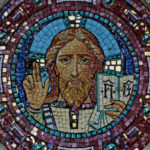We run our website the way we wished the whole internet worked: we provide high quality original content with no ads. We are funded solely by your direct support. Please consider supporting this project.
Revelation 17:8 refers to people whose names haven’t been written in “the book of life from the creation of the world.” Doesn’t this conflict with open theism?
As in Revelation 13:8, the clause “from the foundation” (apo kataboleis) need not mean “from before the foundation” but simply “from the foundation” (= since the foundation). It’s not that names either were or were not written in the “book of life” before they were ever born. Rather, throughout history, in response to the choices people made, God either wrote or omitted their names from the “book of life.” The fact that names may be blotted out even after they’ve been included (Exod. 32:33; Rev. 3:5, cf. Rev. 22:18) further suggests this “book of life” is not eternally written in stone.
Category: Q&A
Tags: Bible, End Times, New Testament, Open Theism, Q&A, Responding to Calvinism, Revelation
Topics: End Times, Providence, Predestination and Free Will, Responding to Objections
Verse: Revelation 17
Related Reading

Q&A: If Salvation Depends on our Free Choice, How are we Saved by Grace?
As a companion to today’s testimony and the link to Greg’s thoughts on Romans 9, we thought it would be helpful to post this Q&A on salvation by grace within the Open View of the future. Enjoy! Question: I’m an Arminian-turned-Calvinist, and the thing that turned me was the realization that if salvation hinges on whether…

How do you respond to 1 Kings 13:2–3?
The Lord proclaims against the pagan alter of Jeroboam, “O altar, altar, thus says the Lord: ‘A son shall be born to the house of David, Josiah by name; and he shall sacrifice on you the priests of the high places who offer incense on you, and human bones shall be burned on you.’ He…

God’s Regrets and Divine Foreknowledge
One aspect of the portrait of God in Scripture that suggests the future is partly open is the fact that God sometimes regrets how things turn out, even prior decisions that he himself made. For example, in the light of the depravity that characterized humanity prior to the flood, the Bible says that “The Lord…

How do you respond to 2 Timothy 1:9–10?
“…this grace was given to us in Christ Jesus before the ages began, but it has now been revealed through the appearing of our Savior Christ Jesus…” Those who hold that the future is eternally settled and that God knows it as such sometimes argue that God had to foreknow who would believe in order…

How do you respond to Proverbs 16:4?
“The Lord has made everything for its purpose, even the wicked for the day of trouble.” Calvinists often cite this verse to support the conclusion that some people are created wicked for the expressed purpose of being sent to hell. Since Scripture teaches that God is love (1 John 4:8, 16), that God loves all…

The Centrality of Christ in Hebrews, Part 1
The intense Christocentricity that the New Testament writers embrace is nowhere more clearly and consistently illustrated than in the book of Hebrews. Throughout this work we find a repeated emphasis on the many ways the revelation given to us in Christ surpasses that of the Old Testament. The author begins by stressing how the revelation…
